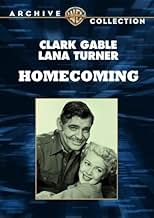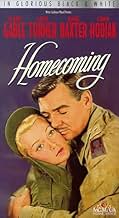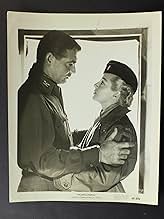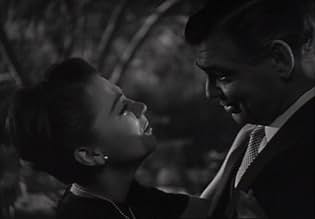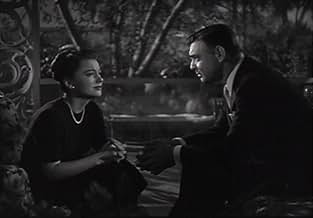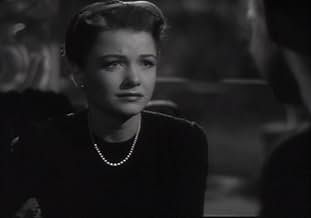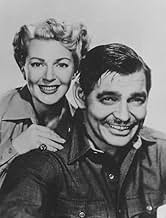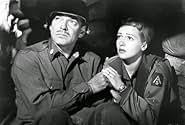IMDb-BEWERTUNG
6,8/10
1197
IHRE BEWERTUNG
Füge eine Handlung in deiner Sprache hinzuAt the end of WW2, aboard a repatriation ship, an Army doctor reminisces about his war years while being interviewed by a reporter.At the end of WW2, aboard a repatriation ship, an Army doctor reminisces about his war years while being interviewed by a reporter.At the end of WW2, aboard a repatriation ship, an Army doctor reminisces about his war years while being interviewed by a reporter.
- Regie
- Drehbuch
- Hauptbesetzung
- Auszeichnungen
- 4 wins total
John Albright
- Corpsman
- (Nicht genannt)
Frank Arnold
- Maitre d'Hotel
- (Nicht genannt)
Peggy Badley
- Nurse Betty Simpson
- (Nicht genannt)
Art Baker
- Williams, Reporter on Transport Ship
- (Nicht genannt)
Gregg Barton
- Captain
- (Nicht genannt)
Nanette Bordeaux
- Nurse
- (Nicht genannt)
Empfohlene Bewertungen
Sometimes I don't understand those who judge the quality of a film, because this one deserves more credits. With classic cinema it happens as when one reads past history, you must place yourself in the historical moment, to better understand the reason for the events and the behavior of its protagonists.
The subject of this film must have happened many times in the years of World War II, as was a fact mentioned by the heirs of those who lived through it, the plot of the 1970 film Sunflower. In the solitude of the battlefield, many Military doctors must have fallen in love with their beautiful nurse on duty.
The scene where Lana Turner and Grant kiss for the first time is unforgettably beautiful. The initial attitude between the two as military leaders is perfect. So is officer Useless's erratic behavior when he returns from the war to his wife, and his longing for home, everything seems strange to him. I believe that there was no American soldier who did not suffer this crisis upon returning from the battlefield, after several years of fighting.
The final dialogue between the misplaced officer and his wife is like a parody of what many of those American heroes lived through.
It is true that it is not easy for young people today to watch Black and White films from the classic cinema, I advise them to try to locate themselves in time, and try to understand at the same time the limitations of the technology of that time. They will realize if they achieve it, that cinematographic art prevailed here.
The subject of this film must have happened many times in the years of World War II, as was a fact mentioned by the heirs of those who lived through it, the plot of the 1970 film Sunflower. In the solitude of the battlefield, many Military doctors must have fallen in love with their beautiful nurse on duty.
The scene where Lana Turner and Grant kiss for the first time is unforgettably beautiful. The initial attitude between the two as military leaders is perfect. So is officer Useless's erratic behavior when he returns from the war to his wife, and his longing for home, everything seems strange to him. I believe that there was no American soldier who did not suffer this crisis upon returning from the battlefield, after several years of fighting.
The final dialogue between the misplaced officer and his wife is like a parody of what many of those American heroes lived through.
It is true that it is not easy for young people today to watch Black and White films from the classic cinema, I advise them to try to locate themselves in time, and try to understand at the same time the limitations of the technology of that time. They will realize if they achieve it, that cinematographic art prevailed here.
Clark Gable, Lana Turner, Anne Baxter, John Hodiak, and Gladys Cooper star in "Homecoming," a 1948 film about wartime and its aftermath.
Gable plays a surgeon, Lee, who falls for a nurse (Turner) with whom he puts together the wounded, endures a life with only the barest of necessities, sits in shelters, and dodges. Back home, his devoted wife (Baxter) realizes by reading his letters that she's losing him.
World War II has been romanticized often in films and in music - somehow, it is perceived by people who lived through Vietnam, Desert Storm, and our current conflicts as being somehow a cleaner war. But no war is clean, and there were some homecomings that were difficult as well. This was touched upon in "The Best Years of Our Lives," and very well here.
The story is brought to life by its players. The role of Snapshot the nurse is a different one for the glamorous and beautiful Turner than what she was normally handed - the curse of the beautiful in Hollywood. She was capable of much more, and she gives a strong performance as an outspoken soldier who finally lets her vulnerability show.
The stalwart Gable gives us a man who realizes the detached attitude he had toward his patients at home will no longer work, and he has to rethink himself and his life.
Baxter is the "one left out," who can't experience the war, and she gives an excellent portrayal of a woman who loves her husband but doesn't know what to expect from him when he comes home. "I know he's changed," she laments, "but why couldn't we have changed together?"
Her real-life husband, John Hodiak, looks quite handsome but doesn't have much to do as a family friend - his brief brush with stardom was a few years away.
A very nice movie that shows that homecoming can be uncomfortable and bittersweet.
Gable plays a surgeon, Lee, who falls for a nurse (Turner) with whom he puts together the wounded, endures a life with only the barest of necessities, sits in shelters, and dodges. Back home, his devoted wife (Baxter) realizes by reading his letters that she's losing him.
World War II has been romanticized often in films and in music - somehow, it is perceived by people who lived through Vietnam, Desert Storm, and our current conflicts as being somehow a cleaner war. But no war is clean, and there were some homecomings that were difficult as well. This was touched upon in "The Best Years of Our Lives," and very well here.
The story is brought to life by its players. The role of Snapshot the nurse is a different one for the glamorous and beautiful Turner than what she was normally handed - the curse of the beautiful in Hollywood. She was capable of much more, and she gives a strong performance as an outspoken soldier who finally lets her vulnerability show.
The stalwart Gable gives us a man who realizes the detached attitude he had toward his patients at home will no longer work, and he has to rethink himself and his life.
Baxter is the "one left out," who can't experience the war, and she gives an excellent portrayal of a woman who loves her husband but doesn't know what to expect from him when he comes home. "I know he's changed," she laments, "but why couldn't we have changed together?"
Her real-life husband, John Hodiak, looks quite handsome but doesn't have much to do as a family friend - his brief brush with stardom was a few years away.
A very nice movie that shows that homecoming can be uncomfortable and bittersweet.
This is a far from perfect film featuring Gable and Turner, but upon seeing it for the second time, it sure seemed a lot better than I remembered it. In particular, I appreciated that the film took a pretty big risk dealing with wartime romance between a married doctor and a nurse when they are stationed overseas. This sort of situation MUST have happened quite a bit with all those nurses and WACS/WAVS, etc. serving in action, though it is hardly ever mentioned in any film up until that time. Plus, it offered a very unusual situation where a man is in love with a woman he is not married to and yet he still loves his wife at home. Pretty adult fare for 1948, I must say! The film begins with Gable a rich and successful doctor in the States. He is very isolated from the real world and his main focus in on the country club and his pampered wife--unconcerned about much else. When the war comes, he does serve but seems to be pretty selfish. His head nurse in the field hospital is a much more giving and selfless individual and they are destined to hate each other because they are so different AND because this IS Lana Turner and Clark Gable (this plot device is necessary before they actually fall in love--a bit of a cliché, I know).
Gable and Turner are both excellent as the leads and their scenes together are excellent as well. I especially appreciated Lana's emotional range--it was better and more vulnerable here than I am used to seeing. The direction was pretty good and all the MGM production values were going full speed ahead! I especially appreciated the snow scene--you KNOW it was done in a sound stage and yet it STILL looked exceptional (though their breath didn't show--considering it was probably close to 70 degrees).
Overall, this is a must-see for Gable fans and a pretty good flick for anyone but people who MUST have a lot of action in their films. Despite being WWII, the film is pretty talking and there is quite a bit of romance--something action junkies will probably have a hard time accepting.
Gable and Turner are both excellent as the leads and their scenes together are excellent as well. I especially appreciated Lana's emotional range--it was better and more vulnerable here than I am used to seeing. The direction was pretty good and all the MGM production values were going full speed ahead! I especially appreciated the snow scene--you KNOW it was done in a sound stage and yet it STILL looked exceptional (though their breath didn't show--considering it was probably close to 70 degrees).
Overall, this is a must-see for Gable fans and a pretty good flick for anyone but people who MUST have a lot of action in their films. Despite being WWII, the film is pretty talking and there is quite a bit of romance--something action junkies will probably have a hard time accepting.
2nd viewing and a lot of time in between.
Enjoyed it first time especially how Lana pulls her role off and how sincere Gable was. Both great actors always worth watching. Anne Baxter was also very,very touching and deep as the wife.
What really got me this time, having spent war time in Nam, was the changes Gable went through and the HOMECOMING. Anyone who has NOT experienced the razor's edge of actual combat, the terror the elation and the horror of seeing others die can feel what Gable projected magnificently in coming home after all that madness and trying to feel like you fit in again anywhere. You don't....for a long time. That why Gable said "...bear with me for a while..." Not only was he talking about losing Lana but returning home from a war, sometimes much more difficult than war itself. This film has so much deep feelings embedded in all three major characters it is amazing to me. The writer nailed it and Mr LeRoy was almost genius in bringing out such performances by all. I'm glad I got to view it on TCM a 2nd time. It really brings out a HOMECOMING!!
Enjoyed it first time especially how Lana pulls her role off and how sincere Gable was. Both great actors always worth watching. Anne Baxter was also very,very touching and deep as the wife.
What really got me this time, having spent war time in Nam, was the changes Gable went through and the HOMECOMING. Anyone who has NOT experienced the razor's edge of actual combat, the terror the elation and the horror of seeing others die can feel what Gable projected magnificently in coming home after all that madness and trying to feel like you fit in again anywhere. You don't....for a long time. That why Gable said "...bear with me for a while..." Not only was he talking about losing Lana but returning home from a war, sometimes much more difficult than war itself. This film has so much deep feelings embedded in all three major characters it is amazing to me. The writer nailed it and Mr LeRoy was almost genius in bringing out such performances by all. I'm glad I got to view it on TCM a 2nd time. It really brings out a HOMECOMING!!
As a rule I'm not much into romantic films, but there are exceptions and Homecoming is one of them.
Clark Gable and Lana Turner did four films together and this is the third one. It's Turner's show here. It's a great tribute to her charisma and star quality that she looks incredibly sexy in those army fatigues she has to wear as per the plot. Lana Turner in her
younger days had a quality of winsomeness that was never showcased than when she plays Jane "Snapshot" McCall, idealistic army nurse.
In this cynical age we would look with incredulity that a widow with a young son would follow her late husband off to war because his ideals became her ideals. Yet Turner makes you believe that in this film.
The plot is simply Clark Gable, very successful doctor in a small mid-west city, goes to World War II basically because its expected of him. He's a self centered guy, nice home, loving wife played very well by Anne Baxter, all the material things you could want and not a clue about why we are in World War II. He has a fellow physician friend, John Hodiak who does a lot of pro bono public service work who tries to act as a conscience, but fails. I guess Turner had something to offer Hodiak didn't.
At first Dr. Ulysses Johnson (Gable) and Nurse McCall don't hit it off after she's assigned to him as a nurse. But her beauty and idealism get to him he falls for her big time.
Because its 1948 Hollywood and Anne Baxter is by no means a bad person there was no way Turner was going to wind up with Gable in the end. She has to die, but Turner is given a death scene that is one of the most moving in the history of film. You have to be made of stone not to be touched by her and Gable at her bedside.
John Hodiak, a very talented and almost forgotten figure today is also terrific as Gable's friend Dr. Robert Sunday. Gable will be working with Hodiak at the clinic Hodiak has in a poor neighborhood and he will be doing it because of the social conscience Turner has instilled in him.
There are no bad people in this film except the Nazis shooting at Gable Turner and the rest of Eisenhower's army.
I believe this is Lana Turner's best film and fans of her's should not miss this one.
Clark Gable and Lana Turner did four films together and this is the third one. It's Turner's show here. It's a great tribute to her charisma and star quality that she looks incredibly sexy in those army fatigues she has to wear as per the plot. Lana Turner in her
younger days had a quality of winsomeness that was never showcased than when she plays Jane "Snapshot" McCall, idealistic army nurse.
In this cynical age we would look with incredulity that a widow with a young son would follow her late husband off to war because his ideals became her ideals. Yet Turner makes you believe that in this film.
The plot is simply Clark Gable, very successful doctor in a small mid-west city, goes to World War II basically because its expected of him. He's a self centered guy, nice home, loving wife played very well by Anne Baxter, all the material things you could want and not a clue about why we are in World War II. He has a fellow physician friend, John Hodiak who does a lot of pro bono public service work who tries to act as a conscience, but fails. I guess Turner had something to offer Hodiak didn't.
At first Dr. Ulysses Johnson (Gable) and Nurse McCall don't hit it off after she's assigned to him as a nurse. But her beauty and idealism get to him he falls for her big time.
Because its 1948 Hollywood and Anne Baxter is by no means a bad person there was no way Turner was going to wind up with Gable in the end. She has to die, but Turner is given a death scene that is one of the most moving in the history of film. You have to be made of stone not to be touched by her and Gable at her bedside.
John Hodiak, a very talented and almost forgotten figure today is also terrific as Gable's friend Dr. Robert Sunday. Gable will be working with Hodiak at the clinic Hodiak has in a poor neighborhood and he will be doing it because of the social conscience Turner has instilled in him.
There are no bad people in this film except the Nazis shooting at Gable Turner and the rest of Eisenhower's army.
I believe this is Lana Turner's best film and fans of her's should not miss this one.
Wusstest du schon
- WissenswertesAccording to the AFI catalog entry for this film, for the battle scenes in Italy, MGM constructed five 35-foot towers, a full-sized evacuation hospital, and more than 100 Army tents at the Lasky-Mesa movie ranch 35 miles outside of Hollywood. The set took three weeks to build and the scenes used hundreds of extras, five cameras, and six assistant directors. This was all for a re-creation of the historic capture of the Anzio beachhead in Italy by U.S. and British forces on January 22, 1944.
- PatzerAt the end, Penny Johnson says she followed her husband's movements on a map. During World War II, people in the military had it drilled into them that they could not say anything about where they were in letters sent back home, and to make sure they kept that rule, the mail from soldiers was censored. This has been mentioned in numerous histories of World War II. With Clark Gable being an officer, it's even less likely any information about his movements around Europe would have been available to his wife.
- VerbindungenEdited from Ihr erster Mann (1940)
Top-Auswahl
Melde dich zum Bewerten an und greife auf die Watchlist für personalisierte Empfehlungen zu.
Details
- Erscheinungsdatum
- Herkunftsland
- Sprache
- Auch bekannt als
- Renunciación
- Drehorte
- Produktionsfirma
- Weitere beteiligte Unternehmen bei IMDbPro anzeigen
Box Office
- Budget
- 2.654.000 $ (geschätzt)
- Laufzeit
- 1 Std. 53 Min.(113 min)
- Farbe
- Seitenverhältnis
- 1.37 : 1
Zu dieser Seite beitragen
Bearbeitung vorschlagen oder fehlenden Inhalt hinzufügen


